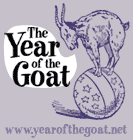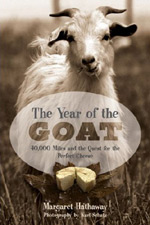Over the years, they have enlisted the help of Peter's teenaged nieces and nephews. At first, the kids were invited to come out for a few weeks in the summer, but in the last few years, both of Peter's siblings and his parents have moved to Maine, and now the kids are around full time after school and on weekends. We had scheduled our appointment so that they could be there, and on the day we visited, Andrea, a junior in high school who just moved from California, and Andrew, a sophomore from Texas, had come over to help show us around. The two amazed us with their knowledge, not only about goats, but also about the farm and its philosophy.
It was the philosophy of Wendy and Peter, and by extension of Springtide Farm, that we found compelling. The land was beautiful, and from the top of one clearing you could see the Atlantic. The horse cart was thrilling, especially for the few seconds when no one was at the reins and they just took off. The goats were a whole new breed to learn about and observe. But what really stuck with us, and kept us talking the whole ride home, was how fully formed and moral were their ideas about their animals.
We didn't really talk to them about their farming ethos until relatively late in our visit. After watching the four of them do a round of morning chores, which had been postponed until our arrival, Wendy suggested that we visit the bucks. The six of us piled into the cab of one of their pickups, and drove from the main farm, where the does and horses are kept, to a sort of satellite farm for the bucks, which is also their original piece of property and is now where Peter's parents live. Standing in the dusky field, big bucks rubbing their horns against our pants-legs, the conversation turned to slaughter.
After giving these goats a full life in a setting that even humans would envy, it is important to Wendy and Peter that their deaths are swift, tranquil, and humane. They don't sell live animals to be turned to meat. The two of them accompany each animal to the slaughter and hold the goat while it is killed. It's wrenching for them, but as Peter put it, every tear that he and Wendy shed is one that the goat doesn't. Even when it's not raised on their farm, Wendy and Peter eat only free range meats, and this sensitivity is one that they've passed along to the next generation of Peter's family. Andrea, otherwise a vegetarian, said the only time she doesn't feel uncomfortable eating meat is when she knows it comes from Springtide Farm. It's a preoccupation with the quality of life, from birth to comfortable life to as painless a death as possible, that informs the care giving to animals at Springtide Farm. And this, to us, seemed an incredibly moral approach.
An almost full moon had risen over the water, and to our right, it beat a platinum path to the shore. As we made our way back to the main farm, we continued to talk about the meat industry, and our own mortality; Peter said he wants to go quickly and then be stuffed, which brought groans from the back. To us, however, it was exactly that attitude that made this visit extraordinary. Even in levity, a profound respect for both life and death was evident in all that we saw of Springtide Farm. — MMH


